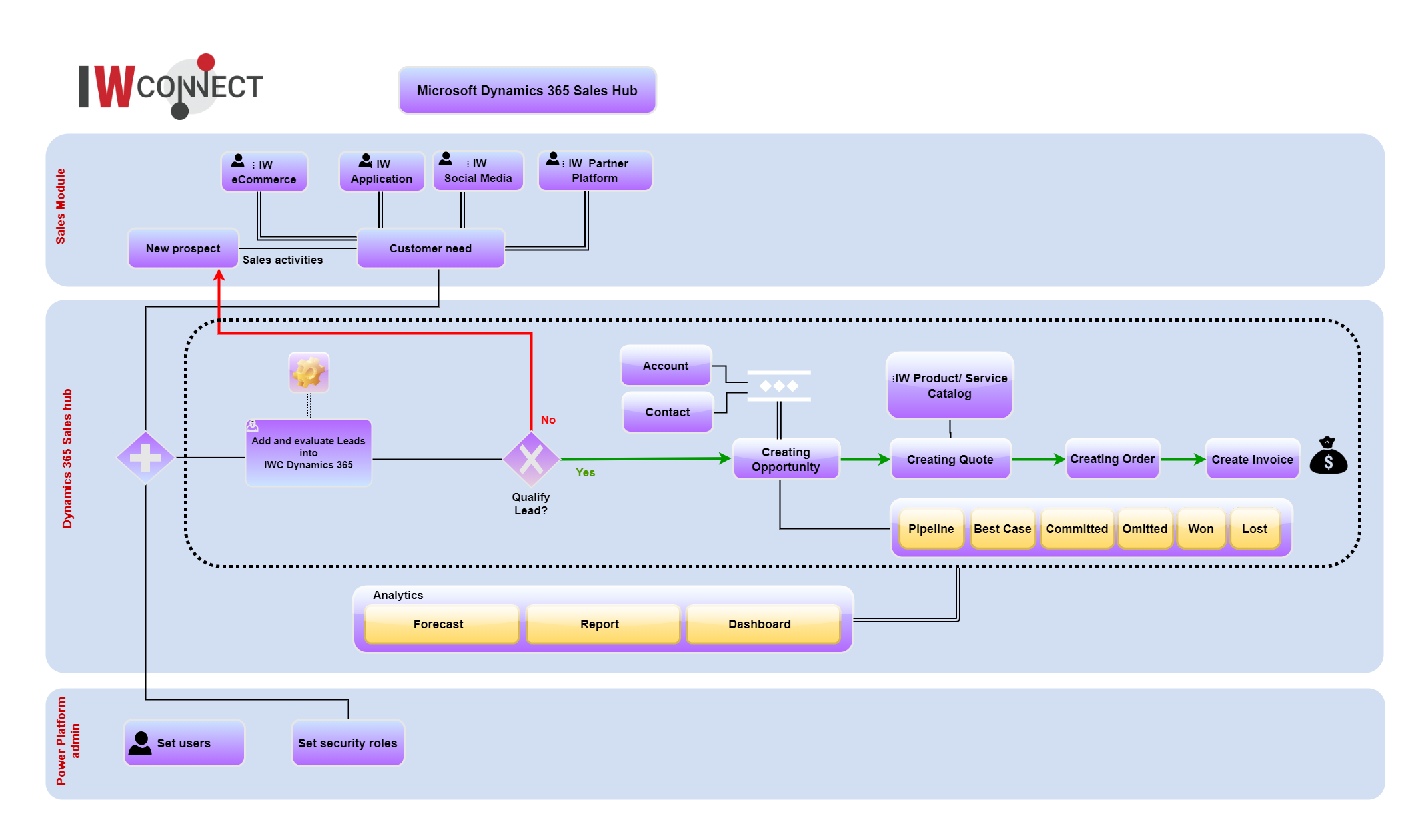As time passes and technology evolves, the fields of sales and marketing are changing as well. In our blog post Marketing and sales evolution and the need for their alignment, we already discussed their evolution and why these two fields should be aligned. Whereas, this blog post is oriented towards the sales department, and how it can be further improved by using Dynamics 365 and its sales hub. (If you want to read about Dynamics 365 – Marketing hub, you can do that here: Improve your marketing department by using Dynamics 365).
Building and nurturing strong relationships with clients, taking actions based on reliable insights, and shortening the sales cycle are key to business growth. In addition, every business owner is aware of the importance of finding new clients and the effort that salespeople invest to find new leads, qualify those leads, and nurture them to the buying stage. To ease this process and achieve growth targets faster, business owners invest in CRMs that help salespeople sell. As mentioned in our blog posts Dynamics 365 – Your hub for your sales and marketing teams, Dynamics 365 is one such tool, which incorporates several different modules, among which are Marketing and Sales hub, and allows keeping track of accounts and contacts, selling more effectively and as a team, winning customers and on top of it, integration with Marketing hub and external systems.
About Dynamics 365 – Sales Hub
Dynamics 365 Sales Hub is a sales platform that offers storing and organizing leads systematically, tracking sales in real-time with dashboards, creating invoices based on the products sold, and more. It is a fully customizable and scalable platform, which allows easy data import and integration with external applications. For example, you can integrate it with LinkedIn’s Salesforce Navigator feature and enable the automatic adding of leads directly from Salesforce Navigator. You can do the same with Outlook and Microsoft Teams and ensure that you do not lose any opportunity – the integration options are endless.

Some of the many features that Dynamics 365 offers are:
- Rich dashboards where you can see all at a glance and you can filter per your preferences
- Completely Customizable Accounts & Contacts fields
- You can add as many accounts and contacts as possible, and you can customize the fields that you want to be displayed and filled, and even make a mutually exclusive field, i.e. if one field is filled, then the other doesn’t have to be. In addition, it provides a timeline of all activities related to a particular contact, including sent/received emails.
- Qualifying a lead to an opportunity
- A complete overview of where you stand with your lead. This feature incorporates a customizable progress bar, showing how far you have come to closing a deal along with customizable options under each of the statuses. You can add as many steps as you want, and under each step, you can define the requirements that should be fulfilled for a step to be marked as a completed step and move on to the next step. This feature also incorporates a timeline of all activities related to that lead.
- Forecasts & Goals
- Defining products & resources
- Adding and customizing prices and more.
Dynamics365 covers the entire sales lifecycle:
Lead – Opportunity – Quote – Order – Invoice – Reports
Benefits of Using Dynamics 365 Sales Hub
The benefits of using Dynamics 365 Sales Hub are multiple, not only for salespeople but also for sales managers. Here are some of them:
Benefits for salespeople
- Automated and guided sales processes that give salespeople insights on what to do next to close deals faster
- Ability to manage customers and deals anytime, anywhere, and from any device
- An automated way of adding new leads directly to Dynamics 365 from external applications, such as LinkedIn, Outlook, Microsoft Teams, etc.
- Reminders and notifications to connect with a customer
- A central place for all activities related to a customer or an opportunity
Benefits for sales managers
- Improved performance of the sales team based on insights received from real-time analytics
- Real-time monitoring of results and activities, along with prompt feedback
- Various reports allow easy tracking, comparing results, and monitoring performance.
In addition to this, Dynamics 365 allows the creation of sales collateral and the distribution of that collateral to the referred accounts. As mentioned at the beginning of the blog post, the Sales hub integrates with the Marketing hub and allows automation of many of the processes that affect both processes.
For our own purposes, we have customized Dynamics to automatically segment the newly added contacts and accounts according to their industry, size, preferences, and challenges. In this way, we have facilitated the process of sending email newsletters, and sales collaterals, which on the other side saves time both to our marketing and sales teams and improves efficiency. To sum up, this is just a summary of what Dynamics 365 – Sales hub can do for your sales team. If you want to find out more about the customization we have done, contact us via the form below. You can also find some of the videos that we have created and relate to Dynamics 365 on our YouTube channel.

